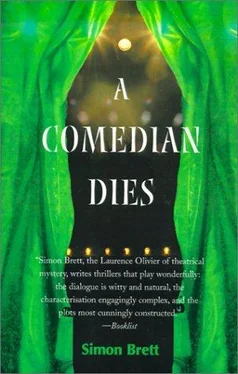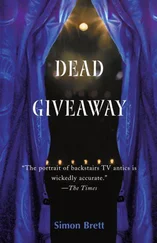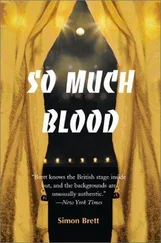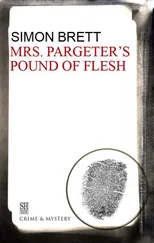Simon Brett - A Comedian Dies
Здесь есть возможность читать онлайн «Simon Brett - A Comedian Dies» весь текст электронной книги совершенно бесплатно (целиком полную версию без сокращений). В некоторых случаях можно слушать аудио, скачать через торрент в формате fb2 и присутствует краткое содержание. Жанр: Классический детектив, на английском языке. Описание произведения, (предисловие) а так же отзывы посетителей доступны на портале библиотеки ЛибКат.
- Название:A Comedian Dies
- Автор:
- Жанр:
- Год:неизвестен
- ISBN:нет данных
- Рейтинг книги:5 / 5. Голосов: 1
-
Избранное:Добавить в избранное
- Отзывы:
-
Ваша оценка:
- 100
- 1
- 2
- 3
- 4
- 5
A Comedian Dies: краткое содержание, описание и аннотация
Предлагаем к чтению аннотацию, описание, краткое содержание или предисловие (зависит от того, что написал сам автор книги «A Comedian Dies»). Если вы не нашли необходимую информацию о книге — напишите в комментариях, мы постараемся отыскать её.
A Comedian Dies — читать онлайн бесплатно полную книгу (весь текст) целиком
Ниже представлен текст книги, разбитый по страницам. Система сохранения места последней прочитанной страницы, позволяет с удобством читать онлайн бесплатно книгу «A Comedian Dies», без необходимости каждый раз заново искать на чём Вы остановились. Поставьте закладку, и сможете в любой момент перейти на страницу, на которой закончили чтение.
Интервал:
Закладка:
‘It may be a bloody good line but it’s not a Lennie Barber line,’ the comedian would reason patiently before Paul Royce once again flung himself out of the room.
There was one oasis of calm in the turmoil of rehearsals. It was another barbershop sketch which had been taken intact from the original Barber and Pole music hall act. The set-up was as before and so were the catch-phrases, but the jokes were different. Still as corny as in the other sketch and still, handled by Lennie Barber, magic. Again he directed Charles in the timing of the piece, leaving Wayland Ogilvie mouthing at the corner of the Drill Hall. Charles knew the sketch could not fail to work and that, given time to tailor and familiarize himself with the new material, Barber could be brilliant throughout and make a sensational comeback.
But television schedules are tight and there was only a fortnight of rehearsal for the fifty-minute programme. With constant interruptions for rewrites, as well as the deprivations of costume fittings, design conferences and so on, there was just not going to be enough time.
Charles was not involved a great deal in the show, in spite of his grandiose billing in the title. He did the barbershop sketch and a couple of other quick items as Wilkie Pole. The rest of the time was filled by modem sketches featuring Lennie Barber and the team of comedy supports, an opening and closing monologue by the comedian and two guest spots.
The guests were a dance group (not in fact These Foolish Things, but totally indistinguishable from them) and a French singer whose big sad eyes and cloying romanticism won the adulation of agoraphobic housewives and the detestation of their red-blooded British husbands. Because of the tight schedule these two items were to be pre-recorded the day before and played in to the studio audience.
The dancers presented no problem. They just came in and did the Chuck Sheba dance to their pre-recorded vocal and music tracks, thus filling another three minutes of television time with viewzak.
But the French singer needed introducing. He was a guest on the show and Walter Proud was keen to have show business guests right through the (conjectural) series, so Lennie Barber had to learn how to give schmaltzy show business introductions. This part of the show probably caused more scripting problems than any other. Lennie Barber did not have the natural fulsomeness of the well-loved television personality at the awards lunch and the French singer’s agent turned down flat the idea of an insulting intro (which would have been the comedian’s natural style). Eventually a compromise was reached and the introduction was rewritten into a little sketch for Barber and Pole.
The French singer came into vision and Lennie Barber did not recognize him and kept getting his name wrong. Wilkie Pole knew who the man was and was acutely embarrassed by his partner’s ignorance and rudeness. After some linguistic by-play, Lennie Barber finally pronounced the guest’s name correctly (whereupon, on the night, the Floor Manager would cue applause from the studio audience).
The result of this was that Lennie Barber and Charles Paris were required in the studio on the day before the main recording.
The French singer proved to be arrogant and humourless, but the little introductory sketch was recorded satisfactorily after the usual long camera rehearsal, false starts, retakes, cutaway shots, etc. As it turned out, Lennie could have delivered a really vicious introduction, since the French singer seemed to have no English except for the tortured words of the song he sang (and from the way he sang it, he didn’t even understand them).
Charles and Lennie sat in the audience seats while the Frenchman mimed through a rehearsal of his song. He got involved in an altercation with Wayland Ogilvie, which seemed, so far as one could judge from the copious gestures, to be about which of his profiles was the better. Charles and Lennie stopped watching.
‘Do you get any excitement, Lennie, sitting here, where the audience is going to sit tomorrow and see you perform?’
‘Excitement, no. Nothing. Not in a television studio. You don’t get any feel of the audience when you’ve got all those cameras and monitors in the way. Now if this was a theatre, that’d be something else. . I can never sit in a theatre without getting a little flutter of excitement. I think it goes back to when I was kid and used to watch my old man from out front. Used to swell up with pride before he come on, could hardly breathe. I’d look round at all the people sitting there and I’d think, They’ve all come to see him, and he’s my Dad. Still get that funny feeling in the theatre.’
An elegiac mood had descended on them. There was no need to talk. Charles gazed round the studio, taking in the glittery set, the enormous number of people milling round the French singer, all the cameramen, sound boom operators, floor managers, scene shifters, make-up girls, prancing wardrobe assistants and grim-faced men whose function was known only to their shop stewards. He felt a slight tremor of fear. Television always frightened him. In front of so many people, apart from the audience, he never felt he could give a natural performance.
He looked on up to the lights and monitors hanging down from the grid. Then along the gallery that ran round the top of the studio walls. Somebody was standing up there at the corner, looking straight down at him.
It was Chox Morton.
Charles touched Lennie’s sleeve very gently. ‘Don’t look suddenly, but Chox is up there.’
‘Where?’
‘In the lighting gallery.’
The comedian moved his head slowly until the menacing, emaciated figure came into his line of vision. ‘Shit. Yes. It looks like he doesn’t think you were scared off sufficiently!’
‘If he’s come to scare me a bit more, he’s certainly succeeding. What shall I do?’
‘Look, you nip out of the studio through the control box. I’ll go and have a word with him and tell him you’ve gone home.’
‘He’s hardly going to believe you. I’m still in make-up and costume.’
‘He won’t think of that.’
‘You mean he thinks I normally go around in a red frock coat and red check trousers.’
‘Leave it to me. If I keep him talking long enough, you’ll have had time to get changed. But just stay in the back of the control box for about an hour. He’ll have gone by then.’
‘OK. I hope you are right. There’s rather a lot of electrical equipment round this place. Paradise for a murderer like Chox.’
‘Don’t worry, the unions won’t let him touch a thing. You can bet that in television there’s a special union in charge of electrocution.’
‘Ha bloody ha.’
Charles sat on a thickly upholstered seat in a small annex separated by glass from the main control room. It was designed for the accommodation of television executives, foreign buyers, agents of very important artists and directors’ girl-friends, but now it was empty. No one wanted to watch the pre-recording of an opening caption sequence on a Tuesday evening at eight o’clock.
He felt shivery and ill at ease. He trusted Lennie Barber, but suppose the comedian could not get to Chox, or suppose Chox didn’t believe him about Charles’ departure. . He began to wonder, too late as usual, why the hell he got himself into these situations.
On the opposite wall of the control room was the bank of monitors which showed the views of the various cameras and Charles watched these in a desultory manner to pass the time. Only two of the cameras seemed to be doing anything relevant. They were making a complicated sequence of graphics, superimposed on slides, which kept breaking down because the two pictures would not stay exactly in line. Tempers in the box were fraying. Wayland Ogilvie kept bawling out the vision mixer and muttering sulphurous asides about Pisceans. The vision mixer snapped back angrily. Only the PA Theresa maintained her customary cool, calling shots with the unruffled poise of a metronome.
Читать дальшеИнтервал:
Закладка:
Похожие книги на «A Comedian Dies»
Представляем Вашему вниманию похожие книги на «A Comedian Dies» списком для выбора. Мы отобрали схожую по названию и смыслу литературу в надежде предоставить читателям больше вариантов отыскать новые, интересные, ещё непрочитанные произведения.
Обсуждение, отзывы о книге «A Comedian Dies» и просто собственные мнения читателей. Оставьте ваши комментарии, напишите, что Вы думаете о произведении, его смысле или главных героях. Укажите что конкретно понравилось, а что нет, и почему Вы так считаете.












